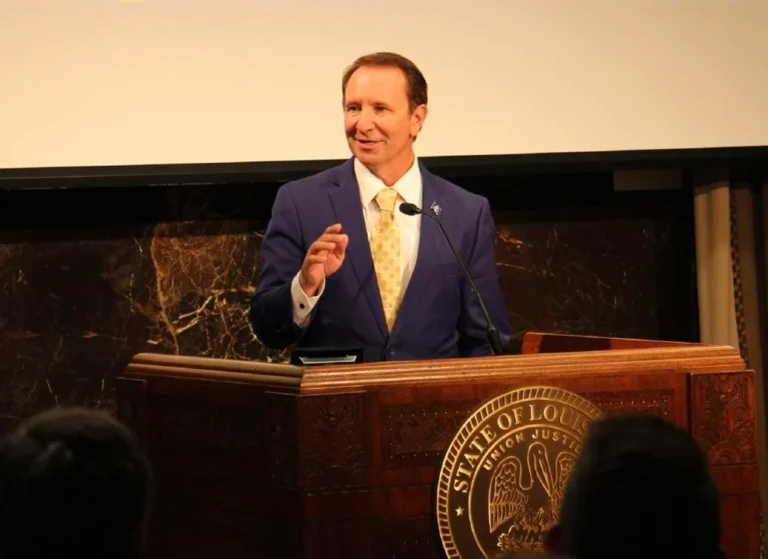(The Center Square) – Louisiana Gov. Jeff Landry, while citing the economic potential of carbon capture and sequestration, on Wednesday ordered a moratorium on approvals of new Class VI injection wells and mandated that state agencies and departments work together to develop procedures and processes to advance the industry.
Landry said he has heard the concerns of citizens and communities in Louisiana and called on state agencies, departments and local officials to work together in the development of a clear roadmap ensure that applications for proposed projects follow state rules for carbon injection and CO₂ pipelines.
Currently, applications for 33 carbon sequestration projects have been filed with the Louisiana Department of Energy and Conservation, with each estimated to require approximately 2,000 hours of review between the time of submission and the issuance of a permit.
The governor directed the Department of Energy and Conservation to reevaluate the status of current Class VI applications for assessment and prioritization over the next 45 days.
Landry said Louisiana is positioned to be a national leader in carbon capture and sequestration because of the state’s unique geology, extensive industrial infrastructure – including pipelines and LNG facilities, along with a highly skilled energy workforce and expansive port systems. For over 40 years, CO₂ has been injected in the geological formations within Louisiana for use in enhanced oil recovery projects, the governor noted.
CO₂ capture and storage will extend Louisiana’s presence in energy by creating as many as 17,000 jobs, the governor said. Potential investments from already announced capture and storage projects across Louisiana total $76 billion, driving economic growth on a scale unimaginable for Louisiana, Landry said.
Trade groups and representatives of Louisiana’s energy industry voiced concerns about the governor’s executive order.
“Louisiana’s energy industry has invested tens of billions of dollars into putting our state at the head of President Trump’s Energy Dominance Agenda,” Tommy Faucheux, president of the Louisiana Mid-Continent Oil & Gas Association, said in a statement. “We appreciate the Governor’s vocal support for this effort and recognition of the role Carbon Capture and Storage will play. However, we are concerned this executive order threatens to create hurdles for that future investment,”
Faucheux noted CO₂ transportation and injection have been a part of Louisiana’s energy industry for almost five decades and added there is a robust regulatory framework to ensure its continued safety.
“We want to work with Governor Landry to maximize this potential. Let’s not let Texas, and other states waiting in the wings, take this moment from us because we put any more obstacles in our own way,” said Faucheux.
Will Green, president of the Louisiana Association of Business and Industry (LABI), said that while the Landry administration wants to facilitate carbon capture and sequestration in the state, Wednesday’s executive order on carbon capture and sequestration sends the wrong message. The governor’s order risks ceding Louisiana’s competitive advantage to neighboring states eager to move forward with carbon capture and storage investments, said Green.
“The momentum Louisiana has built is no accident. It is the direct result of securing state primacy and leveraging our unique geology, world-class energy infrastructure and highly skilled workforce,” said Green.
“We cannot yield our position to states like Texas that stand ready to capture these same opportunities. CCS (Carbon capture and storage} represents a chance to strengthen Louisiana’s energy sector and make us the energy giant of the future we know we can be, Green said.
Louisiana Oil & Gas Association President Mike Moncla said the state has safely regulated the injection of CO2 for more than 40 years. Moncla said that since 2010, over 47 billion metric tons of CO2 have been safely injected and stored in Louisiana formations.
“We respectfully disagree with the Governor‘s decision to halt the review of any new CCUS applications,” said Moncla. “We are thankful that the Governor didn’t cancel existing CCUS projects, which will continue to prove how safe this technology actually is, and we encourage industry to continue moving forward with the hope that the Governor will lift this moratorium sooner rather than later,” he said.
The Louisiana Chemical Association said in a statement that carbon capture and storage (CCS) is a critical part of maintaining and growing the manufacturing industry in our state. “A pause on applications, regardless of the reasoning, signals uncertainty for projects that enable lower-emissions production, support thousands of high-wage jobs, and encourage future reinvestment,” the association said.
The Louisiana Chemical Association said it remains committed to working with the governor, state agencies, and local officials on carbon capture and storage projects in the state. “Louisiana should proudly lead the nation in safe, responsible industrial decarbonization rather than signaling hesitation that allows other states to seize this opportunity,” the association said.

